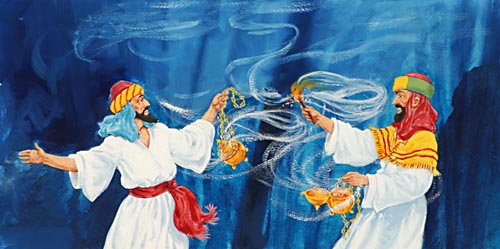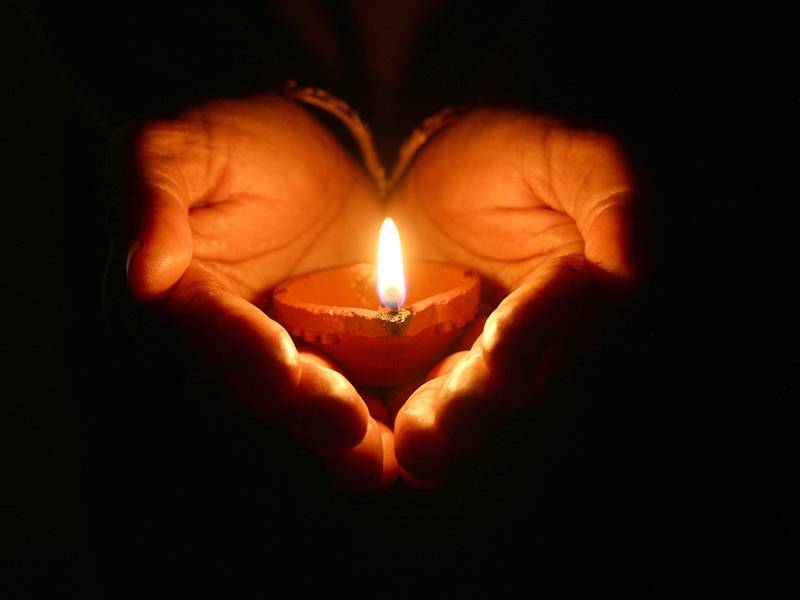Bonjour / Hello [nickname_else_first_name]
Table of contents
1) Perashat Hashavoua - Rabbi Eli Mansour
2) Halakhat Hashavoua (Halakhot related to day to day life) By Hazzan David Azerad -
Yom Tov Dates and the Basis for Diaspora Practice -Peninei Halacha
3) Holy Jokes!
4) For KIDS

This Week's Parasha Insight with Rabbi Eli Mansour
Parashat Shemini: Crying for the Sons of Aharon
In Parashat Shemini (10:1-2), we read of the death of Aharon’s two older sons, Nadab and Abihu, who were consumed by a heavenly fire when they brought an incense offering inside the Mishkan on the day the Mishkan was inaugurated. This was a grave national tragedy, which transformed a day of great joy and celebration into a day of mourning.
In the wake of Nadab and Abihu’s death, Moshe presented a number of instructions to their bereaved father, Aharon, and then said, "Your brethren, the entire House of Israel, shall cry for that which G-d has consumed" (10:6). It appears as though Moshe issued a command to the nation to cry and mourn the loss of Nadab and Abihu.
The obvious question arises as to why such a command was necessary. Nadab and Abihu were two of the four Kohanim who that very day began serving in the Mishkan for the first time. They were righteous, beloved young men, who died while bringing an offering to G-d. Nothing could be more tragic. Did Beneh Yisrael need a special command to cry?
Interestingly, this is not the only time when we find a "command" to cry for Nadab and Abihu. The Mishna Berura (621), citing from the Zohar, writes that it is proper for one to try to bring himself to tears on Yom Kippur thinking about the tragic death of Nadab and Abihu. Indeed, we follow the custom to sing before the Torah reading on Yom Kippur a special hymn in a slow, mournful tone about Nadab and Abihu. Just as Moshe encouraged the people to cry over Nadab and Abihu, we, too, make an effort to grieve and cry over their deaths. How do we explain this crying?
We might suggest an answer based on the well-known story told in Masechet Berachot (22b) of the final moments of Rabban Yohanan Ben Zakai’s life. His students gathered around his deathbed, and they saw he was crying. They asked why he cried, and he explained, "Two paths are before me – one to Gan Eden and one to Gehinam, and I do not know to which I am being led. Shall I not cry?" It seems, at first glance, that Rabban Yohanan cried because he was afraid he might be led to Gehinam. But could this possibly be true? Did Rabban Yohanan Ben Zakai, the great leader and sage, really fear that he might be sentenced to Gehinam?
The answer, perhaps, is that Rabban Yohanan was referring to one of the most dangerous schemes of the Yeser Ha’ra. Often, knowing that a person will not succumb to temptation, the Yeser Ha’ra will try to lure a person to sin by disguising the sin as a Misva. A truly righteous, devoted person will remain strong and steadfast when faced with temptation, but is vulnerable when an evil deed appears to him as a Misva. In his great love for Misvot, he could easily be misled and commit the forbidden act. For example, a person might consider it a great Misva to embarrass somebody who is less religiously observant than he, or to spread negative information about him. When a sin is clothed as a Misva, even the most righteous and purest Sadik is at risk.
This was Rabban Yohanan’s fear. He cried because the Yeser Ha’ra has a way of confusing the roads to Gan Eden and to Gehinam. The Yeser Ha’ra is able to make a sin look like a Misva, thus posing a formidable challenge even for somebody like Rabban Yohanan Ben Zakai. Rabban Yohanan told his disciples that although he was confident that he avoided the clear-cut sins, he feared that he may have on occasion followed the wrong path, choosing the road that leads to Gehinam because the Yeser Ha’ra made it appear as though that road leads to Gan Eden.
The commentators give several different explanations for the precise nature of Nadab and Abihu’s sin for which they were killed. All agree, however, that Nadab and Abihu thought they were doing the right thing. These were, as mentioned, righteous men, and undoubtedly, they committed the act thinking they were performing a sacred, sublime act of service to Hashem. And this is why Moshe Rabbenu instructed the people to cry. He wanted them to take note of the grave danger that lurks, as the Yeser Ha’ra makes sins look like Misvot. On Yom Kippur, too, as part of our process of introspection and repentance, we need to reflect upon the message of Nadab and Abihu’s death. We need to remember that many things we do thinking they are noble and commendable are, in fact, sinful. And this realization should bring us to tears, just as it led Rabban Yohanan to weep on his deathbed.
How do we avoid this danger? What can we do to ensure we do not mistake sins for noble acts?
Our Rabbis give us two pieces of advice. First, we need to pray, and beseech G-d for the clarity and wisdom we need to carefully distinguish between right and wrong, and to avoid sinful conduct even when it appears virtuous. Secondly, we need to learn, study and consult with Rabbis. Yosef’s brothers thought they were doing something noble by selling Yosef as a slave, figuring he posed grave danger to the family. If they had consulted with Yaakob Abinu, they would have realized their mistake, and this tragic story would never have happened. The more we learn and the more we seek guidance from our Rabbis, the more capable we will be of distinguishing between acts that are noble and acts that are sinful, so we can avoid the dangerous traps set for us by the Yeser Ha’ra.

Halachot this week are selected and Translated by Hazzan David Azerad
The Laws of Counting the Omer- The Mitzvah and its meaning -Peninei Halacha
Starting from the night of the Omer harvest, there is a mitzvah to count forty-nine days, which are seven weeks. The Omer is harvested on the sixteenth of Nissan, which coincides with the night after the first day of Pesach. That night, [our ancestors] would go out [to the fields], cut down stalks of barley, bring them to the Temple courtyard, thresh them, winnow them, separate the chaff, toast the grains, grind them well, produce a tenth of an eifah of flour, sift it in thirteen sifters, mix it with a log [measure] of oil, and place upon it a kometz (around ¾ of a handful) of levonah (frankincense). The next day, [part of the mixture] would be offered on the altar. First, a kohen (priest) would wave it, and then he would separate a kometz [approximately ¾ of a handful] from the mixture and burn it on the altar. After the kometz was burnt, everyone was permitted to eat from the new grains.
It is important to know that the holiday of Shavu’ot does not have a calendar date like the other holidays do. For example, Pesach begins on the 15th of Nissan and Sukkot on the 15th of Tishrei. The date on which Shavu’ot falls, however, is determined by the Omer count. The holiday arrives after the seven-week count is completed, which is why it is called Shavu’ot – the Festival of Weeks. This is the meaning of the verse: You shall count for yourself seven weeks; from when the sickle begins [to cut] the standing crop shall you begin to count seven weeks. Then you shall observe the Festival of Weeks for the Lord your God (Devarim 16:9-10). It also says, You shall count for yourselves from the morrow of the 'Sabbath' – from the day you bring the Omer of waving – seven weeks; they shall be complete. Until the morrow of the seventh week, you shall count fifty days, and you shall offer a new meal offering to the Lord (VaYikra 23:15-16).
This mitzvah is not incumbent upon the [Supreme] Rabbinic Court alone; rather, every Jew is commanded to count forty-nine days. And everyone must verbalize the sefirah (count) themselves. In general, we have a rule when it comes to mitzvot that involve speech: “One who hears is as one who responds.” Therefore, for example, one can fulfill the mitzvah of remembering Amalek by hearing the reader [read Parashah Zachor]. Similarly, one can fulfill his obligation to recite a blessing over the counting of the Omer by hearing the leader’s blessing. Concerning the counting itself, however, several poskim hold that everyone must enunciate the count himself, as it says, You shall count for yourselves (Levush, Chok Ya’akov). True, others hold that the law of sefirah is identical to that of other speech-related mitzvot, and one may therefore discharge his obligation by hearing someone else’s count (Pri Chadash, Birkei Yosef). Nevertheless, ideally, we try to satisfy all opinions; therefore, everyone must count for himself (see M.B. 489:5 and B.H. s.v. u’mitzvah).
The foundation of this mitzvah is rooted in our national inception. Chazal explain that the Children of Israel descended to the forty-ninth level of impurity during their bondage in Egypt. This made them unworthy of receiving the Torah and necessitated a purification process. Therefore, HaKadosh Baruch Hu waited seven weeks to enable them to purify themselves from the defilement of Egypt and reach a state in which they could receive the Torah (based on Zohar, Emor 97). The sefirah also expresses our anticipation for the giving of the Torah. The Midrash relates that when Moshe told the Jews that after leaving Egypt, they would serve God on Mount Sinai and receive the Torah, they asked, “When will this service take place?” Moshe answered, “Fifty days later.” Then, due to their great love [for HaShem], they counted every day and said, “Behold, one day has passed; two days have passed,” and so on. On account of their love and anticipation for the Torah, it seemed to them as a long time (Shibolei HaLeket 236).
Thus, Sefirat HaOmer expresses our yearning for that great day, the day on which HaShem gave us the Torah, while we simultaneously undergo a process of purification in all the forty-nine levels of which man is comprised. The purer and “cleaner” one is, the more he will be able to absorb the Torah’s light. In this way, we prepare ourselves every year for the receiving of the Torah by way of the Omer count (see the end of halachah 3, below).
Bevirkat Shabbat Shalom Umevorach
David Azerad
3) HOLY JoKeS!!
Selection of funny snippets, loosely related to this weeks parashah or current events, to brighten your day


4) FOR KIDS
Click on the image to open the youtube video

















